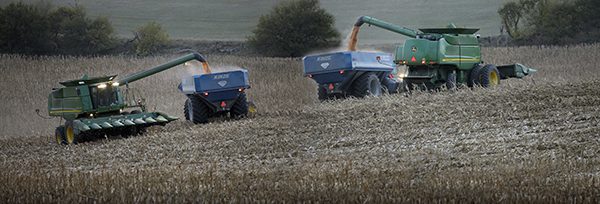
It’s hard to believe that shortly we will be headed back out to the fields with an army of combines, tractors, grain carts and trucks to get the crop out. Typically the combine gets the majority of attention when preparing for harvest, but performing some pre-season preventive maintenance on your grain cart will help to ensure a smoother harvest. Make sure its ready to roll by following these maintenance tips.
INSPECT AUGERS FOR NOTICEABLE WEAR
This is key because over time augers will become smaller in diameter and diminish their overall performance. Inspect for wear especially where grain transitions from the horizontal to vertical auger, or from the lower to upper portion of the vertical auger. These grain transition zones are high-wear areas and when worn, cause slow unloading and extra strain on other driveline components.
CHECK THE PTO / DRIVE BELTS
Make sure they are properly adjusted and that the serviceable parts of the PTO shafts are adequately greased. Check their adjustment, alignment, heavy cracks in the grooves or other visible damage. Also ensure linkage is free to move and engages / disengages smoothly.
CHECK THE GEARBOX OIL
Check gear box oil level and condition, and replace if needed. If gearbox is run by chains, check the chain condition and lubricate.
CART WHEELS
Reset the torque on the wheel nuts and check tire pressure. Check wheel bearings on wheeled carts and lubricate or repack bearings as necessary. For carts with tracks, check track alignment (see operators manual for proper procedure) and belt tension to ensure even wear of track.
SCALE ACCURACY
Check the cart weight of at least five different loads with a legal-for-trade scale. Inspect all grain cart scale wires for damage and secure routing to prevent damage in the field.
HYDRAULIC HOSES
Look for visible wear areas or leaks.
SAFETY CHAINS
Inspect chains to make sure they are in good condition and securely attached.
LIGHTS AND SMV SIGN
Make sure safety features are functional and fully visible.
GENERAL LUBRICATION POINTS
Grease all lubrication points before heading to the field. This includes track wheels, auger hinge area, PTO vertical auger bearing, etc.
TARP
Look over the tarp and make sure there are no tears or wear spots. Make sure it rolls freely and has proper tension when closed. If using an electric tarp, make sure power cables are clean and in good condition. Validate proper operation and that the remote control works properly.
For more information, additional care tips and checklists, refer to the Operator’s Manual or contact your local Kinze dealer.
